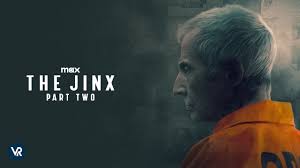‘The Jinx − Part Two’ Further Explores a Murderer’s Motivations

When “The Jinx: The Life and Deaths of Robert Durst” ran on HBO in early 2015, it became not only a pop-cultural touchstone but it changed the shape of true crime television.
Durst’s caught-on-audiotape confession to being a killer created sensational headlines and captivated audiences for months.
Now, even with Durst dead, there is much more to the story, as chronicled by director Andrew Jarecki and executive producer Zac Stuart-Pontier in “The Jinx—Part Two,” a six-part series premiering April 21 on Max.
The docuseries follows the last seven years of Durst’s life from his arrest in 2015, to his conviction and his death in January 2022.
For those who need a refresher, Durst was heir to a New York real estate fortune who had been suspected of three murders, but never convicted: his first wife, Kathleen McCormack Durst, who disappeared in 1982; his close friend Susan Berman, who was shot dead in Beverly Hills in December 2000; and his Texas neighbor Morris Black, whom he dismembered but was acquitted of murdering, claiming self-defense, in 2001.
The filmmakers uncovered more unrevealed information, including Durst’s phone calls from jail and interviews with witnesses who had not come forward previously.
The series also includes candid interviews with defense and prosecution attorneys as well as the judge and jurors.
“In this part two, more people have done more bad things and there now, in some way, being held accountable for that. So getting people to participate in part two is actually a lot harder, but they were caused, compelled, cajoled. There were all different ways of getting them to do it, but ultimately they knew they had to do it,” Jarecki said.
He and Stuart-Pontier answered questions during a recent press conference in Los Angeles moderated by Deadline’s Matt Carey.
Held just a few days after the death of O. J. Simpson, Jarecki also talked about how he hired Simpson murder trial prosecutor Marcia Clark, who advised him to confront Durst with the evidence against him before going to law enforcement, knowing they wouldn’t arrest him right away. The concern was that Durst could ask for a speedy trial and prosecutors would not be ready.
The filmmakers also discussed complicity and who might’ve helped Durst commit his crimes.
“People will follow in the footsteps of dangerous people,” Jarecki remarked. “Ask yourself what you would have done.”

